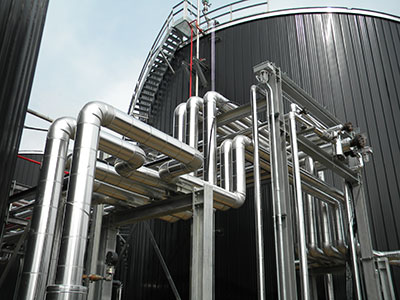Facility downtime and structural failures are costly. Many industrial projects require insulation that can support heavy loads without losing performance over time.
High compressive strength foam glass resists crushing, deformation, and maintains both insulation and protection in demanding industrial environments, making it suitable for tank bases, pipe supports, and flooring applications.

Heavy equipment and tank foundations put incredible pressure on insulation layers. I have managed projects where weak foam failed, putting operations at risk. High compressive strength foam glass protects against such failures and ensures stability even under the heaviest loads. Let’s explore why this material is trusted for major industrial applications.
What gives foam glass its high compressive strength?
Structural integrity is key for industrial insulation. Many lightweight insulations deform or crush under loads. I remember seeing a pipe rack sinking into soft insulation, causing alignment issues. Foam glass stands apart.
The manufacturing process creates rigid, closed-cell glass with uniform strength across the block. No weak points form under pressure.

Manufacturers melt specific glass, blow it with gases, and cool it to form a solid block. This structure supports heavy tanks and machinery. Factories rely on foam glass for bases, cold feet, and bearing pads. Consistent strength means fewer worries about long-term settling or loss of insulation value.
How does high load-bearing foam glass improve tank base insulation?
Industrial tanks hold thousands of liters of chemicals or cryogenic liquids. The base insulation must support static and dynamic loads. I saw one case where compressed insulation caused a tank to shift, requiring costly repairs. Foam glass eliminates this problem.
Foam glass forms a solid, stable foundation with reliable thermal properties. Tanks sit securely atop foam glass blocks, keeping thermal insulation effective and preventing heat bridges.
Thermal and load resistance together make foam glass a top choice. Long life and low degradation maintain efficiency over decades. Maintenance teams report fewer foundation failures, translating to lower total operating costs.
What applications require high compressive strength insulation?
When designing pipe supports, process lines, or machinery bases, high compressive strength is essential. I worked on a refinery project that replaced soft fiber insulation with foam glass at supports, ending years of sagging lines.
Foam glass is vital for tank base insulation, pipe saddles, and raised industrial floors. It keeps systems aligned, blocks heat flow, and avoids settlement.
Operators prefer foam glass under tank bases, cold process lines, LNG pumps, and even green roof systems. Its strength meets safety codes and insurer requirements, making approvals fast and confidence high.
How is foam glass installed for structural insulation?
Installation must ensure even load distribution. Crews clean surfaces, set foam glass in tight contact, and seal joints to prevent cracks. I support using reinforcing tapes and concrete overlays where loads are extreme. Installers appreciate foam glass’s ease of handling and uniform density.
Quick installation and precise cutting save project time. Once set, foam glass requires little attention. This means more uptime for industrial sites and fewer maintenance headaches.
Conclusion
High compressive strength foam glass delivers structural reliability, long-lasting insulation, and safety for industrial applications, supporting heavy machinery and tanks with minimal maintenance.

